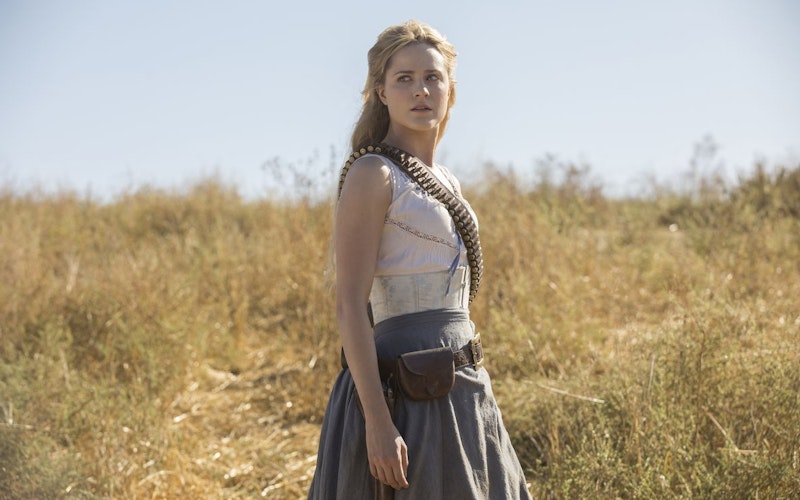
TV
Total Depravity? Welcome to Westworld
With the season finale nearly upon us, let the record show that the second season of Westworld maintains and intensifies the dark theology established in season one. The depravity of humanity is once again on full display in this mature drama about an immersive dude ranch/theme park where guests (called newcomers) pay huge sums to ride horses, join posses, and, if so inclined, indiscriminately rape and murder as many robots (called hosts) as they desire.
In addition to its focus on the inherent darkness of the soul, season two compounds Westworld’s bleak vision with a heavy dose of retributive justice as the hosts rise up against their guests. The emerging worldview almost exclusively embraces a doctrine of total depravity chased by vengeance. In Westworld, pervasive evil abides and needs to be punished.
On one level, Christians should appreciate television that takes evil so seriously. The Man in Black, a longtime guest and the terrifying villain of the show (played with dead eyes by Ed Harris), embraces his evil as a “stain” on his soul; it consequently poisons everything in his life that he claims to love. Conversely, the sensitive cowpoke host Teddy (James Marsden) cannot bear to live with the bloody atrocities he commits after his supposed allies program the sweetness out of him. He knows he needs to be punished. Evoking Old Testament retribution, the most repeated line in season two actually derives from Shakespeare. As they enact their bloody revenge, multiple hosts reprise the ominous phrase first uttered by Friar Laurence in Romeo and Juliet: “These violent delights have violent ends.”
In Westworld, pervasive evil abides and needs to be punished.
This dark theology, of course, fails to capture the full arc of Scripture. Total depravity and retributive lust for “violent ends” is understandable, even justifiable in this cruel context of a fantasy world turned nightmare. Yet we know that the redemptive light of the gospel renders this dark vision incomplete. The shadow of the cross ultimately offers a restorative and love-centric vision of justice. While our Creator maintains the rightful status of righteous judge, God is simultaneously love. Jesus did not come to minister to those who are well, but to those who need healing. Through his life and sacrifice, Jesus therefore offers a redemptive gift available to all the world, a state of grace that the citizens of Westworld do not believe they deserve and would likely never think to ask for: forgiveness.
While Westworld may depict the Fall without Redemption, it does still manage to reflect the beauty of Creation. The visual design of the series is something to behold. Filmed in stunning locations in Utah and California, the cinematography captures the expansive and mythic beauty of the American Southwest. Likewise, the art direction reveals a fastidious care rarely seen on TV. In particular, episode five of season two, “Akane no Mai,” should win awards for art direction. In this change-up episode, refugees from Westworld cross the border into an adjoining theme park based on premodern Japan. Luxuriously traditional costumes, hair, and makeup artfully remind viewers how perfectly made things can seem. Even Dolores, the rancher’s daughter turned cold-blooded revolutionary, notices the visual beauty of her world. Played with a beguiling mixture of innocence and cunning by Evan Rachel Wood, Dolores fondly reflects on her visual surroundings with her trademark phrase, “Have you ever seen anything so full of splendor?” She’s right.
The quality of the acting also demonstrates a high level of artistry. As we learn in season one, many of Westworld’s hosts have begun the painful process of becoming self-aware. By season two, full-blown technological singularity empowers them to rise against their human oppressors. By far the most compelling portrayal of this emancipation comes through Maeve, the feisty brothel owner bravely played by Thandie Newton. In season two, Maeve transforms her one-dimensional, wild-west madam into a richly complex heroine. With wit and verve, she critiques the less creative one-liners written into her code. Her decision to risk her own safety in order to reconnect with her lost daughter—a minor player in a long-discarded storyline—rebels against her programming and rings with maternal pathos.
Yet even as I revel in Westword’s remarkable production values and magnetic acting, I cannot shake the impression that a series acclaimed for raising existential and theological questions ultimately doesn’t have very much to say beyond its harsh adherence to darkness and retributive justice. Thankfully, a study of this unforgiving, fictionalized portrait of creation—so full of visual beauty, degenerate immorality, and rivers of blood—can be countered by a comforting wisdom. As Hebrews 13 reminds us, this city, this Westworld, is not an enduring one; we are looking for “the city that is to come.”
Topics: TV